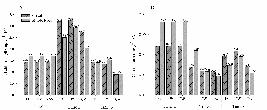Irrigation has enhanced coffee production in several regions of Brazil. However, with the increase in irrigated crop areas, problems related to the frequent and poorly planned usage of irrigation may arise. Since there are few studies related to the physiological alterations in coffee plants exposed to water excess, we evaluated the effects of waterlogging on metabolism and partitioning of carbohydrates, levels of photosynthetic pigments and gas exchange in seedlings of two commercial coffee cultivars (Mundo Novo and Catuaí). After acclimation, seedlings with eight pairs of fully expanded leaves were cultivated under three water availability conditions: field capacity, intermittent waterlogging and continuous waterlogging. Gas exchange and the levels of chlorophyll, carotenoids and carbohydrates were evaluated during the five months after the beginning of the treatments. Waterlogging reduced the rates of photosynthesis and transpiration, leading to lower activity of the carboxylative step of photosynthesis and culminating in the reduction of carbohydrate partitioning in coffee seedlings. Although many physiological parameters were affected by waterlogging, the cultivars in our study survived for five months under stressful conditions.
Water excess; photosynthesis; reducing sugars; stomatal conductance; water efficiency use.

 Thumbnail
Thumbnail
 Thumbnail
Thumbnail
 Thumbnail
Thumbnail
 Thumbnail
Thumbnail
 Thumbnail
Thumbnail
 Thumbnail
Thumbnail
 Thumbnail
Thumbnail






